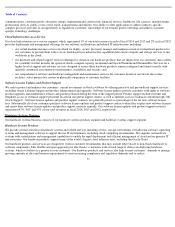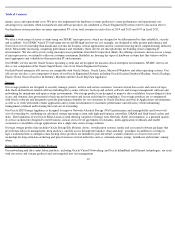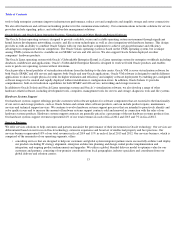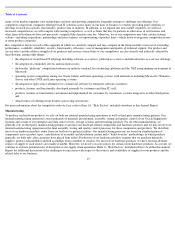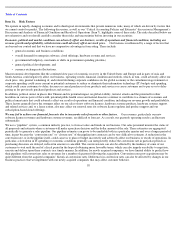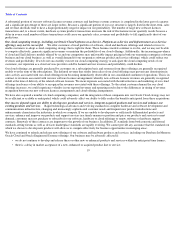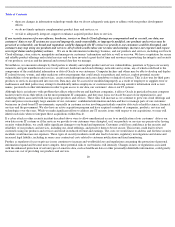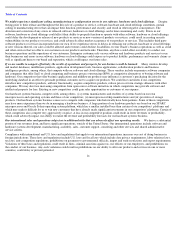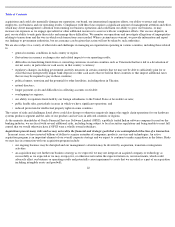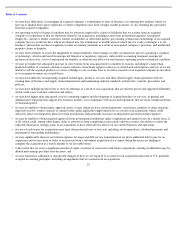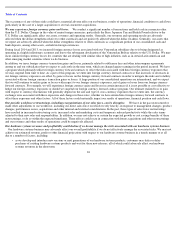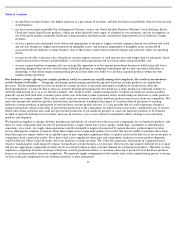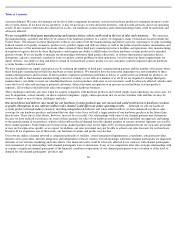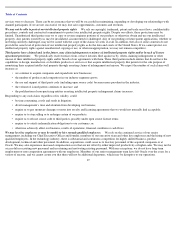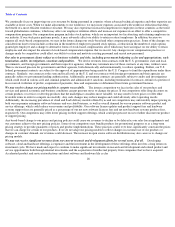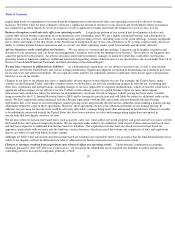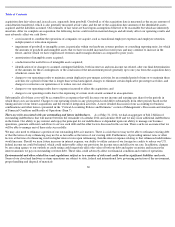Oracle 2013 Annual Report Download - page 25
Download and view the complete annual report
Please find page 25 of the 2013 Oracle annual report below. You can navigate through the pages in the report by either clicking on the pages listed below, or by using the keyword search tool below to find specific information within the annual report.
Table of Contents
We might experience significant coding, manufacturing or configuration errors in our software, hardware and cloud offerings. Despite
testing prior to their release and throughout the lifecycle of a product or service, software, hardware and cloud offerings sometimes contain
coding or manufacturing errors that can impact their function, performance and security, and result in other negative consequences. The
detection and correction of any errors in released software, hardware or cloud offerings can be time consuming and costly. Errors in our
software, hardware or cloud offerings could affect their ability to properly function or operate with other software, hardware or cloud offerings,
could delay the development or release of new products or services or new versions of products or services, could result in creating security
vulnerabilities in our products or services, and could adversely affect market acceptance of our products or services. This includes third party
software products or services incorporated into our own. If we experience errors or delays in releasing our software, hardware or cloud offerings
or new versions thereof, our sales could be affected and revenues could decline. In addition, we run Oracle’
s business operations as well as cloud
and other services that we offer to our customers on our products and networks. Therefore, any flaws could affect our ability to conduct our
business operations and the operations of our customers. Enterprise customers rely on our software and hardware products and services to run
their businesses and errors in our software, hardware or cloud offerings could expose us to product liability, performance and warranty claims as
well as significant harm to our brand and reputation, which could impact our future sales.
If we are unable to compete effectively, the results of operations and prospects for our business could be harmed.
Many vendors develop
and market databases, middleware products, application development tools, business applications, collaboration products and business
intelligence products, among others, that compete with our software and cloud offerings. These vendors include on-premise software companies
and companies that offer SaaS or cloud computing and business process outsourcing (BPO) as competitive alternatives to buying software and
hardware. Our competitors that offer business applications and middleware products may influence a customer’s purchasing decision for the
underlying database in an effort to persuade potential customers not to acquire our products. We could lose customers if our competitors
introduce new competitive products, add new functionality, acquire competitive products, reduce prices or form strategic alliances with other
companies. We may also face increasing competition from open source software initiatives in which competitors may provide software and
intellectual property for free. Existing or new competitors could gain sales opportunities or customers at our expense.
Our hardware systems business competes with, among others, (i) systems manufacturers and resellers of systems based on our own
microprocessors and operating systems and those of our competitors, (ii) microprocessor/chip manufacturers and (iii) providers of storage
products. Our hardware systems business causes us to compete with companies who historically have been partners. Some of these competitors
may have more experience than we do in managing a hardware business. A large portion of our hardware products are based on our SPARC
microprocessor and Oracle Solaris operating system platform, which has a smaller installed base than certain of our competitors’ platforms and
which may make it difficult for us to win new customers that have already made significant investments in our competitors’
platforms. Certain of
these competitors also compete very aggressively on price. A loss in our competitive position could result in lower revenues or profitability,
which could adversely impact our ability to realize the revenue and profitability forecasts for our hardware systems business.
Our international sales and operations subject us to additional risks that can adversely affect our operating results. We derive a substantial
portion of our revenues from, and have significant operations, outside of the United States. Our international operations include software and
hardware systems development, manufacturing, assembly, sales, customer support, consulting and other services and shared administrative
service centers.
Compliance with international and U.S. laws and regulations that apply to our international operations increases our cost of doing business in
foreign jurisdictions. These laws and regulations include U.S. laws and local laws which include data privacy requirements, labor relations laws,
tax laws, anti-
competition regulations, prohibitions on payments to governmental officials, import and trade restrictions and export requirements.
Violations of these laws and regulations could result in fines, criminal sanctions against us, our officers or our employees, and prohibitions on
the conduct of our business. Any such violations could result in prohibitions on our ability to offer our products and services in one or more
countries, could delay or prevent potential
21


